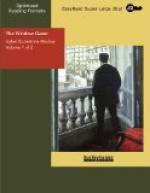Bainbridge was expectant. It was known that Miss Campion was excelling herself in honor of her nephew’s bride, and the bride herself was alluringly rumored to be a personality. It is doubtful if anyone really believed the “part Indian” suggestion, but there were those who liked to dally with it. Its possibility was a taste of lemon on a cloyed tongue.
“They say she is part Indian—fancy, a Spence!” “Nonsense. I asked Dr. Rogers about it and he made me feel pretty foolish. The truth is—her parents are both English. The father is a doctor, at one time a most celebrated physician in London.”
“Physicians who are celebrated in London usually stay there.”
“And I am sure she is dark enough.” “Not with that skin! And her eyes are grey.” “Oh, I admit she’s pretty—if you like that style. I wonder where she gets her clothes?”
“Where they know how to make them, anyway. Did you notice that smoke colored georgette she wore on Sunday? Not a scrap of relief anywhere. Not even around the neck.”
“It’s the latest. I went right home and ripped the lace off mine. But it made me look like a skinned rabbit, so I put it back. I don’t see why fashions are always made for sweet and twenty!”
“Twenty? She’s twenty-five if she’s a day. For myself I can’t say that I like to see young people so sure of themselves. A bride, too!”
“They say Mrs. Stopford Brown hasn’t had a card for the reception.”
“Did she tell you so?”
“Oh, no! But she let it drop that she thought it was on the seventh instead of the eighth.”
“Plow funny! Serve her right. It’s about time she knew she isn’t quite everybody. . . .”
Desire, herself, was unperturbed. To her direct and unself-conscious mind there was no reason why she should excite herself. These people, to whom she was so new, were equally new to her. The interest might be expected to be mutual. Any picture of herself as affected by their personal opinions had not obtruded itself. She was prepared to like them; hoped they would like her, but was not actively concerned with whether they did or not. She had lived too far away from her kind to feel the impact of their social aura. Besides, she had other things to think about.
First of all, there was Mary. She found that she had to think about Mary a great deal. She did not want to, but there seemed to be a compulsion. This may have been partly owing to a change of mind with regard to Mary as a subject for conversation. She had decided that it was not good for Benis to talk about Her. Why revive memories that are best forgotten? She never now disturbed him when he gazed into the sunset; and when he sighed, as he sometimes did without reason, she did not ask him why. She had even felt impatient once or twice and, upon leaving the room abruptly, had banged the door.
So, because Mary was unavailable for discussion, desire had to think about her. She had to wonder whether her hair was really? And whether her eyes really were? She wanted to know. If she could find someone who had known Mary, some entirely unprejudiced person who would tell her, she might be able to dismiss the subject from her mind. And surely, in Bainbridge, there must be someone?




